Good news! Kepler data suggests there could be three hundred million or more potentially life-bearing worlds orbiting sunlike stars in our Milky Way. Sure, some small-minded people might point out the gap between “potentially life-bearing” and “actually life-bearing”—see Mars and Venus—and that just because a world has native life, it does not follow that it will support our sort of life—see deep-sea hot vents—but pshaw to that! Those of us raised on a heavy diet of SF novels know that superluminal travel is merely only one diagram-defaced napkin and a single busy weekend away, and that any vaguely Earthlike world can be settled with sufficient force of will.
Three hundred million is kind of a big number. To put it in universal terms, it is about as many Lego pieces as would be in a tightly-packed cube ten meters on a side. It’s more than enough worlds for one or two to slip through the cracks. Which brings us to that ever-popular trope, the lost colony.
It seems reasonable to distinguish between worlds that were lost by accident and those that were misplaced on purpose. Similarly, one can distinguish between worlds that have since been recontacted and ones that are still on their own. Thus, four basic flavours.1
Accidental, found
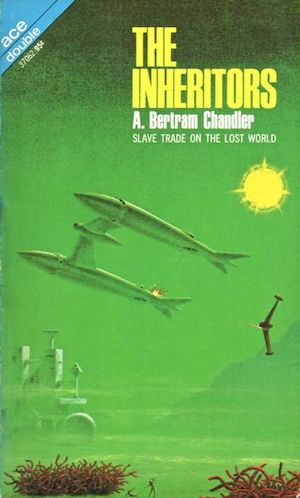
Rim World stories by A. Bertram Chandler feature quite a few lost worlds, thanks to the peculiarities of the once-popular Ehrenhaft Drive.2 Under the proper conditions, an Ehrenhaft Drive-equipped starship could be flung across many light-years, to end up at its destination drained of power and unable to return. Habitable worlds are common in this setting, many of which have been involuntarily settled.
The Survey Service has considerable expertise where lost colonies are concerned. Reintegrating such worlds back into galactic society is a well-practiced art. As young Lieutenant Commander John Grimes discovers in 1972’s The Inheritors, the lost colony on Gamma Argo Four—called “Morrowvia” by its settlers—presents unique challenges. Uniqueness can be an asset, but in the case of the Morrowvians, theirs may leave them vulnerable to a form of brutal but entirely legal slavery that Grimes could be powerless to prevent.
***
Accidental, lost
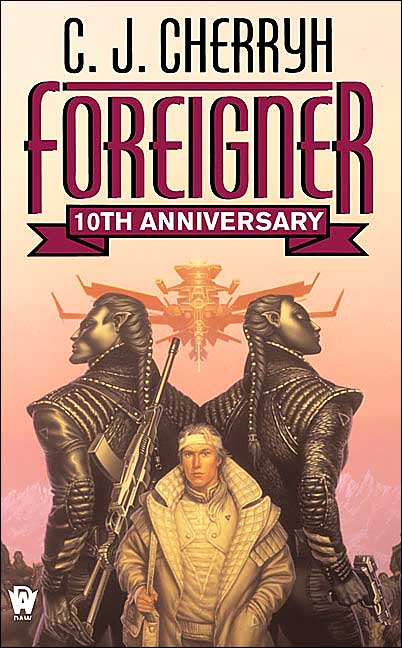
C.J. Cherryh’s long-running Foreigner series (twenty-one books since 1994) begins when the starship Phoenix makes a startling discovery: their star-drive had a previously unsuspected failure mode that could—and in the case of the Phoenix, did—send them so far off course that no identifiable stars were visible. Return home was impossible.
A solar-type star with an Earthlike world was within reach. Inconveniently, the world had a native civilization of sufficient technological sophistication that humans could not hope to dominate. Having failed to conquer, humans reluctantly embrace accommodation. They are confined to their station and an island. All human contact with the atevi is funnelled through one man, the paidhi. It falls to paidhi Bren Cameron to navigate the dangerous world on which his people are trapped.
***
Deliberate, found
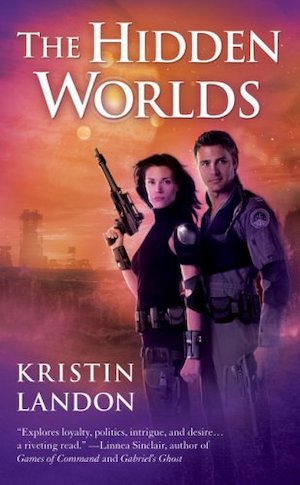
The hidden worlds of Kristin Landon’s eponymous series—The Hidden Worlds (2007), The Cold Minds (2008), The Dark Reaches (2009)—are hidden for good reason. Hiding on habitable worlds concealed within a nebula is humanity’s best hope to elude the machine intelligences that took Earth for their own.
Having led survivors to freedom, the Pilot Masters of the Line established a brutally hierarchal, patriarchal society with—surprise, surprise—themselves at the very top. Their monopoly on starflight made their position unassailable, save for two minor details: they didn’t actually have the monopoly on piloting skills they claimed, and the hidden worlds are not in fact hidden from the Cold Minds.
***
Deliberate, still lost
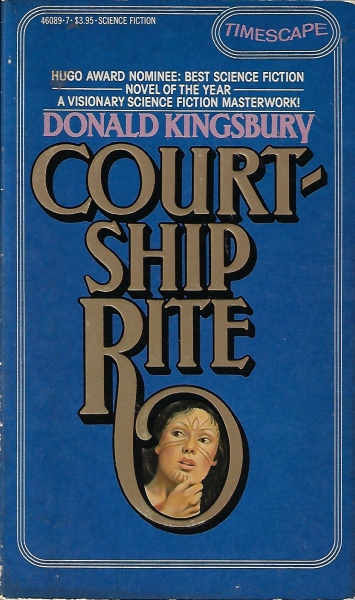
Donald Kingsbury’s Courtship Rite (1982) introduces readers to Geta, a desolate, hostile, metal-poor world setting. It was settled by humans in a distant past. Geta’s native life is biochemically incompatible with terrestrial lifeforms, which in turn means the only food available are the eight sacred plants—Earth crops presumably imported by the original colonists—and humans themselves. These constraints have shaped the settler culture into one any avid Social Darwinist would adore.
Oelita the Clanless One is a heretic who believes humans did not descend from the sky as legend says, but rather evolved from local lifeforms; she disapproves of murder; she frowns on eating human babies. The Gaet group marriage would never consider courting the bright young woman had they a choice. Thanks to political machinations by a rival, they are commanded to marry Oelita. They test her (death if she fails); she wins.
***
Lost colonies are a very popular idea. No doubt you each have your own favourites—I can see all the Pern fans holding their hands up for attention. Feel free to populate the comments with works I’ve overlooked.
In the words of Wikipedia editor TexasAndroid, prolific book reviewer and perennial Darwin Award nominee James Davis Nicoll is of “questionable notability.” His work has appeared in Publishers Weekly and Romantic Times as well as on his own websites, James Nicoll Reviews and Young People Read Old SFF(where he is assisted by editor Karen Lofstrom and web person Adrienne L. Travis). He is a four-time finalist for the Best Fan Writer Hugo Award and is surprisingly flammable.
[1]I did try to come up with a pretext for listing five types (since five is Tor-canonical), but no matter how often I multiplied two by two, it still came out to four.
[2]By the era in which most Rim World stories are set, Ehrenhafts have been replaced by the time-manipulating Mannschenn Drive. Ehrenhafts can maroon you on the wrong side of the Milky Way. Mannschenn Drives can land you in the wrong universe while turning you inside out. Progress!










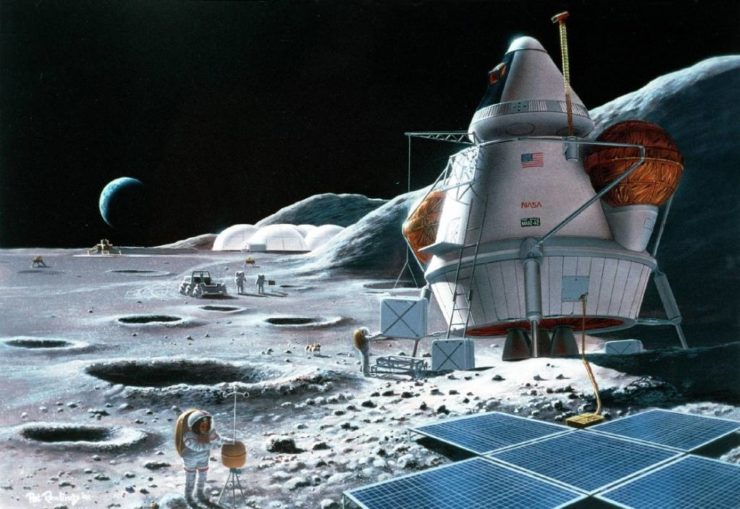
Well, yes, Pern came to mind. More in the “abandoned by the larger community” sense than lost however. The other human worlds know where Pern is, they just think it’s uninhabitable.
I guess the various worlds of Emprise/Enigma/and the third book in that series are in the Deliberate,Found category.
Scalzi’s “The Last Colony” jumps to mind, in Landon’s hidden worlds category hiding from enemies.
Wait, nobody is angry at me for not mentioning Barrayar yet?
Or for that matter, Michael McCollum’s Antares series:

Neither of which fit exactly, since they were deliberately founded but became unreachable without exactly getting lost.
I suppose one could mention that, in Asimov’s Foundation series (I still think of it as a trilogy, because I think everything past Second Foundation was — well, not brilliant), Terra/Earth’s location has essentially been forgotten and the planet itself considered something of a myth.
Eric Frank Russell, “And Then There Were None” – deliberate, sort-of found.
From Jack Vance’s “The Killing Machine”.
See also the four types of objects lost at sea: flotsam, jetsan, lagan, and derelict.
Dan Simmons’ Hyperion Cantos has the AI TechnoCore “losing” Earth – they know where it is, humans think it is gone forever. Not sure whether that counts as found, or not…
Do Darkover novels count by Marion Zimmer Bradley? It’s been a really long time since I read any of them.
What about those poor people on Direidi who had to answer the musical question How Much for Just the Planet?
@5 This story along with three other EFR stories were published as a fixup novel, The Great Explosion. All four would fit under accidental,sort-of-found.
3) Well I was going to complain…
Andre Norton’s “The Last Planet” (aka “The Star Rangers”) involves discovery of a planet that the Central Command has lost complete track of. A rather important planet historically, it turns out.
I thought it was pretty clear you were only doing one per category, and you wanted to signal boost something more obscure. What would be the point of complaining about that?
In some cases, the precise classification might be a spoiler. In Linskold’s _Artemis Awakens_ series (currently 2 books), the resort planet Artemis was lost during the civil war and collapse of an interstellar empire, which makes it hard to know whether it was deliberate or accidental. But since the book opens with an amateur historian crash-landing on it after successfully finding it, I can at least reveal that it belongs on the “found” side — although the finding is not widely known and some people may want it to stay that way…
Hmm. Presumably David Weber’s “Safehold” series fits under the deliberate, still lost cluster – the colony on Safehold having been established specifically to conceal the continued existence of humankind from the alien Gbaba. (I have decidedly mixed feelings about that series, but it’s been successful enough that it really ought to be mentioned in the present context.)
Dumerest of Terra
Also, the current cycle of the German Perry Rhodan series
From Barrayar’s point of view it was the rest of the universe that got lost. Dark over certainly should count as the inhabitants are descended from the passengers and crew of an off course and crashed starship.
Martine, Crest of the Stars: ???, found. Settled by time-dilation STL ship that took unusually long to find a world. This shows a flaw in the deliberate/accidentally lost dichotomy: sometimes it’s just how things are, a matter of wandering off into the dark.
Romulus, The Romulan Way: ditto. Long migration by Vulcan exiles, settled down, found by alien invaders.
Gramarye, Warlock In Spite of Himself: deliberate? found. Bunch of SCA types who probably did want to get lost, but it’s been a while.
Tom Paine Maru: accidental, sort of found. Hamiltonians in the climax of _The Probability Broach_ triggered a bunch of “go to random place and time” drives, leading to planets for TPM to explore and bring libertarianism to. Our POV comes from a world that managed to jury-rig their own spaceship first.
Singularity Sky: somewhat similar time-displaced colonies, but deliberately scattered by the Eschaton, with less libertarianism.
In Andre Norton’s The Stars are Ours/Star Born duology, the planet Astra is in the deliberate/still lost category, given it was populated by scientists fleeing Earth in a sleeper ship (though there’s some ambiguity as they may have just settled the first habitable planet they found). It counts as still lost at the end of the story as the explorers from a much later Earth agree to keep the presence of humans on the planet secret. Evidently it was eventually officially found, since it’s mentioned in other Norton books.
I feel like I’ve identified a fifth category, or maybe several more:
What about planets deliberately seeded with humans or proto-humans by another race? For example, wherever the foursome was sent in Niven’s What Can You Say About Chocolate-Covered Manhole Covers.
Niven’s Protector, wherein Terrans never knew about Pak?
In Hogan’s Inherit the Stars, how would you classify Minerva?
What about stranded colonies: Earth knows where they are but can’t get to them? Barrayar might count – there’s no cannon one way or the other or the planet in Heinlein’s Tunnel in the Sky.
I contend that CJ Cherryh’s world of the Atevi isn’t lost; the humans are marooned, as the Phoenix could no longer access the route back home (I’m not sure if they’re just lost or lost and any possible routes are blocked) .
There’s a helluva lost colony later in the Boundary series by Flint and Spoor. Somebody’s lost colony, anyway.
What about Alastair Reynolds’ House of Suns? The whole Andromeda galaxy is “lost.”
In Poul Anderrson’s The High Crusade, Earth is lost (or more properly, the human character are lost – they don’t know how to get back to Earth).
Makassar and Prince Samual’s World in Jerry Pournelle’s King David’s Spaceship.
Given that humans in most timelines forgot they came from Mars, in Piper’s multiverse,Mars is the lost and forgotten homeworld from the perspective of Earth.
A fantasy example, the two worlds seen in Feist’s novels are meant to be lost worlds from Earth.
Also, Modesitt pulls the same trick with Recluce, which is a lost colony, too.
And the RPG Tekumel takes place in a world lost into a pocket dimension.
@9: it’s not clear what Bradley intended originally — the first books are short on backstory — but Darkover Landfall clearly makes it Accidental-Found (as noted in @16).
John Barnes’s Thousand Cultures books are Deliberate; the first two are specifically Finding rather than Found, with the plots driven by the clash of homogenous-and-individual cultures (Occitan(?) of the troubadours, one particular economic theory, …) suddenly getting the heterogeneous neighborhood on their doorsteps due to the appearance of interstellar teleportation (once a slowship delivers the first gate).
Barrayar is an interesting case; according to LMB, they were proud of having kept the culture they came with sufficiently alive (unlike many cut-off worlds) that all of Shakespeare was still known — but the collected works included three plays unknown to other worlds. Jo Walton was inspired by this to write “Tam Lin by William Shakespeare, as considered canonical on Barrayar.”
David Brin’s “Exiles / Uplift Storm” trilogy is the “deliberately (at first “still lost”, later “found”) category brought to 11. Humans and five other races were hiding their colonies all on the same planet, all for various reasons. And these are only the “official” hidden colonies, there is even another one that is hidden among the hidden colonies.
Considering movies, but applies to so many books:
Same level of gravity – SW, ST, virtually everywhere..
Breathable atmosphere.
Bearable ‘air’ pressure.
Yeah, right…
David Brin’s “Uplift” series is an interesting reversal of this trope – a lot of alien species think that humanity was uplifted to sentience and that there is a mystery race out there somewhere that abandoned or lost the Earth. And the series ends with an event that will permanently lose some worlds, but I won’t say more because spoilers.
Speaking of Cherryh, her Faded Sun trilogy revolves around the quest for a lost world (Kutath, wasn’t it?).
Lots of good stories have Earth as the lost world, or colonists who wished earth would stay lost.
Then there are abandoned colonies, where for whatever reason, the other worlds left them to their own devices. Pournelle’s War World fits this description.
“Transformative Shakespeare” could easily be the subject of a different article (or, indeed, the subject of an entire series of articles, as with the re-reads and discussions here of other writers’ work within the Lovecraft Mythos). That said, listening to the audiobook of Maria Dahvana Headley’s Beowulf: A New Translation recently, I’ve been musing on what Shakespeare might have made of that blood-letting saga.
Sadly, Jo’s version of Tam Lin appears to have once been available online, but not presently.
There are those who believe that life here began out there, far across the universe, with tribes of humans who may have been the forefathers of the Egyptians, or the Toltecs, or the Mayans. Some believe that there may yet be brothers of man who even now fight to survive, somewhere beyond the heavens.
But not anybody familiar with the fossil record, which documents our terrestrial lineage back hundreds of millions of years.
@34, it makes a nice story, and science fiction has to balance plausibility and narrative potential … I like to read novels about ancient aliens, as long as nobody seriously pretends they’re anything but novels.
#34/#35: I think you may have misread #33’s intent (“There are those who believe….”). Sometimes it just doesn’t pay to be subtle…
Oops, see below.
@33, Ah yes the opening narration to the original Battlestar Galactica! I remember wondering why the lost tribes had Greek names rather than Egyptian or Toltec or Mayan.
Richard Hatch was cute. Dirk Benedict was gorgeous and Lorne Greene had incredible gravitas.
Another potential category to conside – would be “Stolen, found” or “Abducted, found” – where aliens forcibly captured humans at some point, who survived and formed their own culture, including overthrowing the aliens, and are eventually reunited with humanity.
David Drake’s Ranks of Bronze, David Weber’s Excalibur Alternative (both set in the same universe), and I swear I’ve read at least one other.
Momus, Barry Longyear’s “Circus World,” inhabited by the descendants of an interstellar circus troupe that crash-landed there. Its society is stratified by the specialties of their ancestors (e.g., acrobats, clowns, barkers, etc.)
hoopmanjh @@@@@ 30: Not really. The mri known to humans are descendants of those who chose to hire on with the regul; Kutath is their home world, for which the last survivors on Kesrith, having been betrayed by the regul, extract coordinates from something the mri have preserved. It’s not even a Dumarest situation; they’ve been going where they were sent by the regul, and now they’re going to a known home.
Dumarest et al are sort of the inverse of the categories Nicoll describes; IIRC, Earth is also lost sometime during the rise of Asimov’s Galactic Empire, and as noted by AndyLove@@@@@12, and probably in other storylines as well, but it’s not a place a species went to (or were dumped on) and ~settled.
Russell H @@@@@ 40: I liked those stories when they came out, but it’s been so long since I read them that I blanked; thanks for the reminder. That suggests to me that Vance’s The Blue World also belongs in the same category (Accidental-Lost): a shipload of criminals makes a new life on a water-covered world. They may have picked the location rather than crashing (or at least having to land before supplies ran out), but they’re about a dozen generations removed from arrival and have forgotten why they came. (Our host cited this book in his Alien Oceans article.)
@41 — That’s what I get for trying to remember something from a book I last read in the 1990s …
@40,
I had forgotten Circus World!
It’s not exactly a lost world but it’s close enough that you might consider it a 5th type.
Colin Kapp’s Transfinite Man. I used to love this but I imagine the suck fairy may have strong with this one.
Spoilers rot 13
Uhznaf bapr unq n tnynpgvp rzcver ohg abj ner vzcevfbarq ba Rnegu naq gurve cbjref xrcg pevccyrq ol gurve jneqref. Uhznavgl vf hanjner gung vg rire yrsg gur cynarg naq vf hanjner bs gur jneqref.
@@@@@ 39 – Jack Vance’s Tschai is a good example of that, with the transplanted humans splitting into dozens of strange cultures, depending upon which species of alien they associated with.
I think the picture at the head of the article is “just” a moon base? i.e. on Luna?
It’s difficult to “lose” a world at that range. So changing that would be the first thing…
“Space: 1999” on TV had the Earth and Moon separated by chain-reaction radioactive handwaving. The Moon then passed near to an unexpected number of habitable planets, more habitable than the Moon anyway. And generally inhabited, by superior aliens, or by whatever superior aliens had invented that turned out to be a very bad idea. Nevertheless, since the Moon couldn’t steer, the option was to jump off (in spaceships, not like in “The Brick Moon”) on the way past. This wasn’t the story every week. Almost nobody actually got to leave, some died trying. One time-slip episode and E. C. Tubb’s novel have them getting back to a devastated Earth: in the TV episode, they find they are already there.
Completely unrelated, “Earthsearch” on radio and novelized had the Earth flee from an unstable star, escorted by artificial suns but not by the moon. A small and rather surprised crew returning from a million year mission (unintended) would like to know where the planet went to. (500,000, who’s counting.) The moon isn’t telling, spoiler?
Riraghnyyl gurl whfg tvir hc naq frggyr ba n qvssrerag cynarg: guvf bar. fhecevfr, gurl’er ernyyl bhe naprfgbef! (v guvax.) naq vg jnfa’g bhe zbba rvgure. gurve “rnegu” pbzrf onpx sbe eriratr, va gur frdhry.
Then there’s stories where Earth isn’t fit to live on and only space colonies survive: in the solar system, you can see it but you can’t go there. “vs v sbetrg gurr, bu rnegu”.
Another by Jack Vance is The Blue World – an all ocean planet settled after the crash of a spaceship carrying criminals to a prison colony.
The short story “Danger – Human!” by Gordon R. Dickson has as its background that Earth is a lost colony of a previous galaxy-spanning human civilization which was destroyed by alien races but Earth survived. And aside from those basic facts, all the aliens of the galaxy remember is a warning: Danger, Human! High Explosive. Do not touch. And it turns out the aliens are just as bad as humans at following simple instructions.
Also, in an ST:TNG episode, they found two human colonies deliberately founded but then lost by the bureaucracy: the pre-tech colony (which for some reason is Irish) and the clone colony.
https://www.tor.com/2011/10/13/star-trek-the-next-generation-rewatch-up-the-long-ladder/
Niven’s “Bordered in black”, where an unknown alien race long ago deposited humans on the single uninhabitable continent of an ocean world, with only the yeast scum along the shoreline for nourishment.